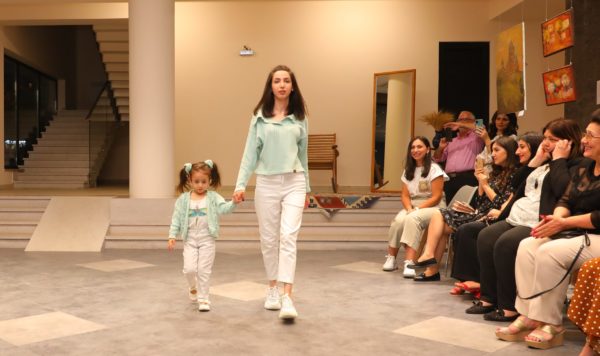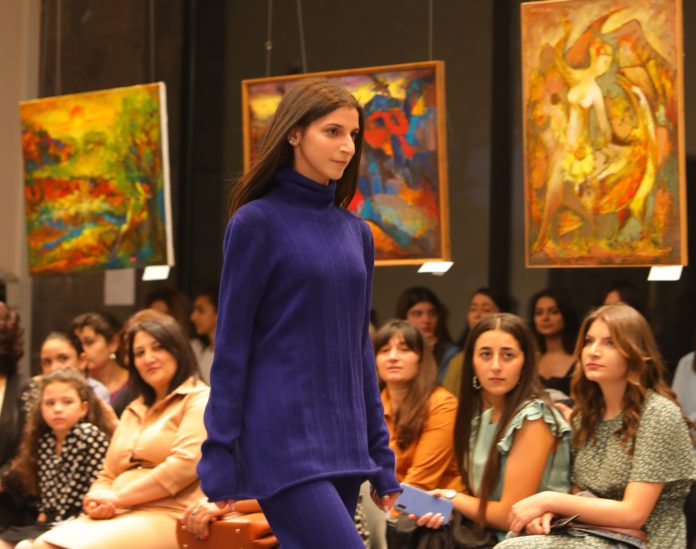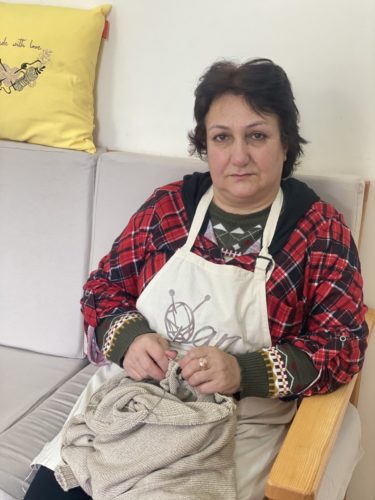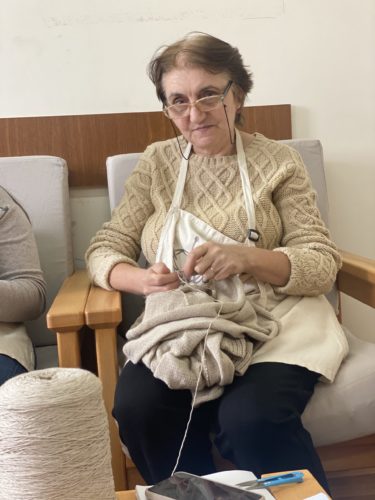By Siranoush Sargsyan
STEPANAKERT — A year ago Artsakh went through 44 days of war unleashed by Azerbaijan, with the aid of Turkish weaponry and international terrorists. To this day, it is still difficult to talk about any expectation of peace with the continuing of suffering and the loss of civilian life. The people of Artsakh are struggling to see the light at the end of the tunnel while living under a constant state of terror and uncertainty. Yet, despite all this, the spirit of the women of Artsakh continues to soar. Yan Spiration is one manifestation of this spirit.
Anoush Manukyan is a young businesswoman from Artsakh. During the war, she and her family lost not only their house in the city of Shushi, but, most painfully, her only brother, Vahe. Despite these very heavy blows, she did not lose confidence in herself. Within a short period of time, she decided to restart the Shushi-based family business, Yan Spiration, in Stepanakert.
Read also
Anoush realizes only too well the uncertainty in which her young son lives. In a recent interview she said that the reason why she could find strength within herself was her dedication to the memory of her lost brother and the many other young men who lost their lives as a result of the Azerbaijani aggression. Anoush said she feels that if she lets her spirit break, it would mean a betrayal of the memory of all those defenders of the homeland.
The goal of Yan Spiration is to create internationally-competitive, high-quality fabrics that will allow diasporan Armenians to connect more closely with Artsakh and Armenia through investments rather than just aid. It is one of the most unique textile factories in the whole region, creating products not only for the domestic market but for export.
A marketing campaign is already underway. After only a month and a half of hard work, its first show took place at the Paul Eluard Center in Stepanakert, on September 15; the next one will take place in Yerevan.
Anoush says Yan Spiration will include a number of promising components as a social enterprise. She said that the shareholders are advised not to take their profits out of the business, but to reinvest them in this or other auxiliary enterprises in Artsakh, or even direct them to select social programs.
“Most importantly, we will have skilled, self-employed women with modern handicraft skills and modern fashion tools,” she added.
Yan Spiration aims to make a stable and continuous contribution to the employment of women in Artsakh, constantly creating a strong connection to handicrafts and entrepreneurship through various events. As an additional value, women are gaining confidence and hope for the future.
Women Working for Their Future
Many of the women working at Yan Spiration hail from regions that were lost to Azerbaijan. They include Arevik Shahramyan, Manoush Harutyunyan, and Susanna Shahnazaryan, all from the region of Taghavard, Lilia Avetisyan from Hadrut and Ina Grigoryan from Madaghis. Having lost their homes as a result of the war, they all settled in the capital of Stepanakert.
What unites these women is their common pain. The craft of needlework, learned from their grandmothers, today allows them not only to earn money to meet the needs of their families, but also to share their pain with each other and try to somehow overcome it.
Every piece of clothing has its own story to tell. They rejoice with everyone because for them this place has become the center of a somehow extended family.
Avetisyan is a math teacher by training. She worked and lived in Hadrut all of her life with her three young daughters. After the war she could not stay in Yerevan and moved to Stepanakert, where she currently lives in a rented apartment. She said she misses the mountains of Hadrut, and it was especially difficult for her to leave the grave of her brother who died in the first war for liberation of the early 1990s.
“During the [recent] war, when Hadrut was in danger, it was difficult for me to persuade my daughters to leave,” she stated, “and because their husbands were in the frontlines, unfortunately my two sons-in-law were wounded.”
She added: “We share the same fate. Each of us seems to recount the whole picture of Artsakh, the lost places. Our pain is one — that’s why we understand each other. But we must continue to live here. If we leave, our language would perish. Therefore we are all responsible for the preservation of our Armenian language and heritage, and in our particular case, for the preservation of the sweet dialect of Hadrut.”
Ina Grigoryan teaches the Armenian language. She said, “I was so young during the first Artsakh war, and during this war my children were going through this tragedy. On the first day of war, I picked up the children rushed to a shelter. People came and said that the Turkish aggressors were approaching our village. I saw a pregnant woman helplessly lying on the ground. We all tried to help each other to escape. The indiscriminate shooting from the enemy against the population of Artsakh was relentless and everywhere, but we somehow managed to escape. The Azerbaijani aggressor forcefully occupied our village, where we had all our livelihood, everything we had, and so, leaving everything behind, we ran out. I still miss each and every bush and tree in the village. But we must continue not to lose hope that we will go back to our village someday. My house is there waiting for me.”
Manoush Harutyunyan was also a teacher and taught in her native village of Taghavard before the war. Now half of her village is under the control of the enemy, and that occupied part is where her house is located. She confessed that she had immense difficulty finding any strength to continue living in Artsakh, far from her native village.
She observed: “I look at these women who have lost their husbands and sons and think, if they can still bear all this unbearable pain, and try continue to live, we must owe something to them, to their inspirational determination. It’s very hard to imagine that these houses we currently stay in all have had people whose relatives perished in that war, and that pain of loss is shared by all of us. But even if we were to leave, those people living there cannot and would not leave, for they have to attend graves of their loved ones which kept them nearby.”
She added, “My children continue to give me strength and hope. My twin sons will go to the army next year, and my 8-year-old daughter says that she is most afraid of forgetting the way to the village. Her words pains me a lot.”
Shahnazaryan spoke with overwhelming emotion about the gardens they used to cultivate in their native village of Taghavard, which today has passed under the control of the enemy. Her son is a soldier who still defends the land. The situation is too much to overcome, with their pain and overwhelming problems. But Susana thinks that a woman should try to overcome all obstacles by continuing to work and be progressive even under the most difficult circumstances.
During the war, she baked jengyalov hats, an Armenian flatbread which is a specialty of Artsakh — lavash dough stuffed with foraged local greens, for soldiers on the battlefield, including her two sons.
Susanna said, “We live in the most beautiful place in the world, but sadly we have no choice but to find a way to get out of this terrible uncertainty. My son is a soldier and he says we should stay here. If our children have an unwavering determination, then we have no right to be broken. As women, we need to have more willpower to support our husbands and children.”
Lusine Aydinyan, who works as an assistant director of Yan Spiration, and does everything possible to organize all sorts of work, thinks that no matter how heavy the burden of uncertainties may be, they should stay and work to revive their livelihood in their homeland Artsakh.
She says: “All our lives now seem so distinct, before and after this war. My children constantly ask a lot of questions about the war, with every sound of explosion and every loud noise associated with that war. They say how the war has left its dark marks on their childhood and in their souls.
“All the talk is about the sad events of the war and this will stay with us forever. I tend not to focus on bad things nor on the difficulties we encounter on daily basis. All I want to do is to be progressing as much as I positively can with my work. I do not even know how long we will live here for, but I am determined to live and work here right to the end and I am very proud that there are women like Anoush doing such a great job with such an inspiration,” Aydinyan said.
She concluded, “All women here are displaced, and everyone has the same goal. We work like a one big loving family. We do not only work hard to keep our families safe and keep our homes, but also make our committed contribution to the development of our homeland Artsakh.”
































































